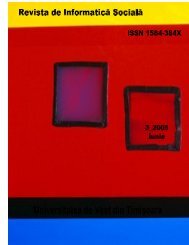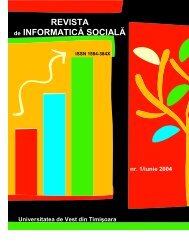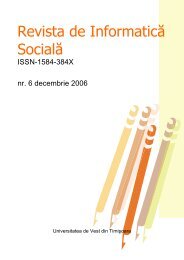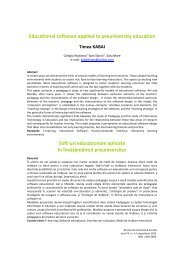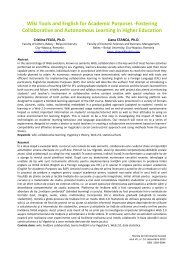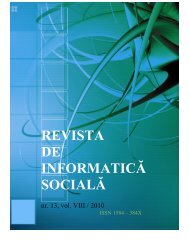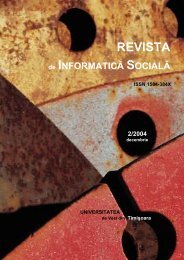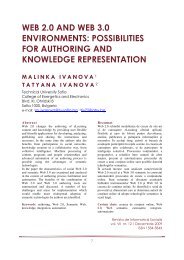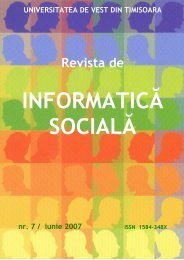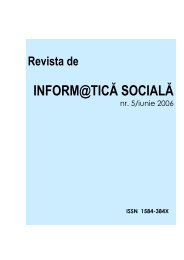No 14 - Journal of Social Informatics / Revista de Informatica Sociala
No 14 - Journal of Social Informatics / Revista de Informatica Sociala
No 14 - Journal of Social Informatics / Revista de Informatica Sociala
You also want an ePaper? Increase the reach of your titles
YUMPU automatically turns print PDFs into web optimized ePapers that Google loves.
IntroductionIn 1995, Bernie Dodge <strong>of</strong>fered to the schools the i<strong>de</strong>a <strong>of</strong> WebQuest [WQ], a research-orientedactivity in which some - or all - information with which stu<strong>de</strong>nts <strong>de</strong>al come from internet (Dodge1995). That proposal, a smart alternative for using internet in the school (Marinho, 2001), was theanswer to a problem that arose when the world wi<strong>de</strong> web [WWW] became wi<strong>de</strong>ly accessible andschools i<strong>de</strong>ntified a new space where stu<strong>de</strong>nts would seek for information in different sources,doing researches. But, immediately, some teachers expressed concerns about the possibility thatstu<strong>de</strong>nts seek for inappropriate sites using school computers, where surveillance would be lowerthan at home. In short, they saw the Internet as an interesting space for the immersion <strong>of</strong> thestu<strong>de</strong>nts in search <strong>of</strong> information, but with a huge potential risk. The proposal <strong>of</strong> the WQ in someway was a solution to that problem. Developing a learning activity with time and products previous<strong>de</strong>fined, where only the recommen<strong>de</strong>d sites for the activity can be accessed, if not prevent at leastmake difficult to the stu<strong>de</strong>nts to visit sites that they should not see. And using only previouslyselected sites, the WQ avoid that stu<strong>de</strong>nts get lost in the vastness <strong>of</strong> cyberspace, a risk if they startclicking an endless hyperlinks collection.One <strong>of</strong> the main reasons for using WQ is exactly the fact that, by combining technology withlearning, it shows an effective way to <strong>de</strong>velop collaboration between stu<strong>de</strong>nts and increase theirmotivation (Abbit; Ophus, 2008). Meanwhile in countries like Brazil the adoption <strong>of</strong> WQ took along time for several reasons: the lack <strong>of</strong> WQ wrote in other languages than English, almost allteachers were not trained to use computer in education and, as consequence, WQ was unknown forthem. <strong>No</strong>t even what we see as simplest variations <strong>of</strong> WQ, as scavenger hunt (Raker, Calla, 2001)and mini-mission (Olive, 2006), became used so far.Since the WQ became more used in schools, naturally it became more known by teachers and,naturally, it became object for the critics. The main issue in the critics is that WQ is too"constrained", giving little - if any - chance for stu<strong>de</strong>nts to adventure on the Internet. If the newsocial skills required for the XXI century society are the ability for using freedom to make choice,the <strong>de</strong>mocratic use <strong>of</strong> the material and cultural resources and the autonomy for <strong>de</strong>cision and action(Gimeno Sacristán, 2003), actually a <strong>de</strong>bate on the WQ a<strong>de</strong>quacy is welcome.We are immersed in a world in transformation, <strong>de</strong>ep and rapid. One <strong>of</strong> the technologicalinnovations that have revolutionized the last century was, with no doubt, the computer. The<strong>de</strong>velopment <strong>of</strong> computer s<strong>of</strong>tware for using in particular sectors <strong>of</strong> social life was an inevitableconsequence <strong>of</strong> this invention. Expan<strong>de</strong>d use <strong>of</strong> computers in schools shows its importancenowadays, but also challenges the curriculum.In the history <strong>of</strong> the school, marked by references to knowledge as stable and sought in textbooks,which implications will have a new way to <strong>de</strong>al with knowledge? That dimension affects thecurriculum that is challenged by two main questions: what is knowledge nowadays and how we can<strong>de</strong>velop strategies in or<strong>de</strong>r to access it.The Internet <strong>of</strong>fers access to "things" with the potential <strong>of</strong> being processedto be transformed in essential information and, therefore, with a moreextensive work, transform themselves into knowledge.Here's a challenge to the curriculum.(KRESS, 2003, p.125)



